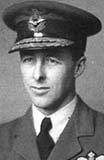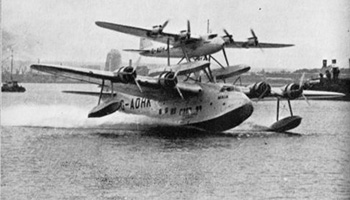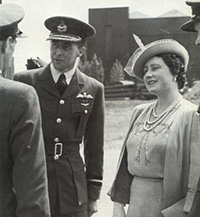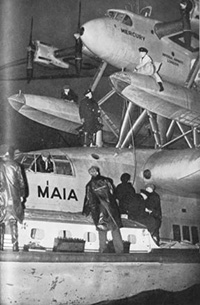

Donald Bennett, the son of a sheep farmer, was born in Toowoomba, Australia on 14th September, 1910. He joined the Royal Australian Airforce in 1930 and the following year he was transferred to the Royal Air Force. Initially posted to 29 Squadron he later became an a flight instructor on Flying Boats.
He was an outstanding aviation pioneer, pilot, navigator, wireless operator and engineer. He joined the Royal Australian Air Force in 1930, transferring to the Royal Air Force from 1931 to 1935. In 1935 Bennett joined Imperial Airways where he achieved several much published flying exploits. He piloted Mercury, a Short Mayo seaplane, on record non stop flights from Iceland to Canada, and Scotland to South Africa. He still holds the long distance record for seaplanes for the latter flight of 9,650 miles in 42 hours.

In 1938 and 1946 he was awarded the Oswald Watt Medal. He co–founded the Atlantic Ferry Organisation, rejoined the RAF in 1941. Bennett became commander of 10 Squadron in April 1942 and he took part in the raid on the Tirpitz. He was shot down but he evaded capture and eventually arrived home via Sweden.
Promoted to the rank of wing commander he was appointed as commander of 77 Squadron in December 1941. In July 1942 Arthur Harris, head of Bomber Command, appointed Bennett as commander of the Pathfinder Force. Bennett eventually promoted to the rank of vice–marshal in 1943,was a great success in this post from 1942 to 1945. Don was the youngest officer promoted to Air Vice Marshal. His awards include Commander of the British Empire, CBE, and Distinguished Service Order, DSO.

Bennett, and Edward Addison, were the only bomber group commanders not to receive a knighthood. Later Bennett became Liberal MP for Middlesbrough West. He also designed and built several light aircraft and cars. Donald Bennett died on 15th September, 1986.
Air Vice Mashall Bennett of Pathfinders rung group captain Hughie Edwards, V.C. D.S.O. D.F.C., and offered the command of 156 Squadron in the Pathfinder force. Hughie visited him at his headquarters and asked for and was refused the command of a mosquito squadron. After returning to Binbrook, Hughie considered the offer of the Pathfinder squadron and then rang Bennett to decline the offer. He had completed two tours of operations, was very comfortable at Binbrook, with a first–rate Lancaster Squadron and was able to do some operations to keep his operational flame alive.

This epilogue was located amongst Don's papers by his wife Ly Bennett after his death. When revealed, it made such an impact that it was read at the 1997 Service at the Allied Air Force Monument on Plymouth Hoe where lie Don's ashes.
"In time of war, men strive and men die for the protection of their country and their loved ones and for the ideals in which they believe. No sacrifice is too great and no ordeal too bitter to deter the tide of human effort towards victory. Indeed, in the agony and squalor of war, man has reached his true greatness but it is only when peace comes that there exist the conditions in which the ideals for which we fought can be achieved.
I have seen two great wars in my lifetime and after each I have seen the political cadres of almost every country fritter away the opportunities which their warriors have created for them. After each war, I have seen the return of pessimism and distrust – and the vitiation of human relations by intrigue, fear, greed and dishonesty.
Normal standards, in matters great and small, have sunk appallingly to impossible levels. In short, man in peace has been proved unworthy of the dead of two world wars.
This need not be. We are the same men and wormen who fought besides those who died. We are made of the same stuff which achieved greatness in time of war. Therefore, in peace, let us think and act as aggressively as we did in war, so that we may achieve freedom, fair play, decency and integrity, internationally and personally – which the dead of two wars so nobly earned."
Harris said of Bennet "His technical knowledge and his personal operational ability was altogether exceptional. His courage, both moral and physical, is outstanding and as a technician he is unrivaled. He could not suffer fools gladly, and by his own high standards there were many fools."